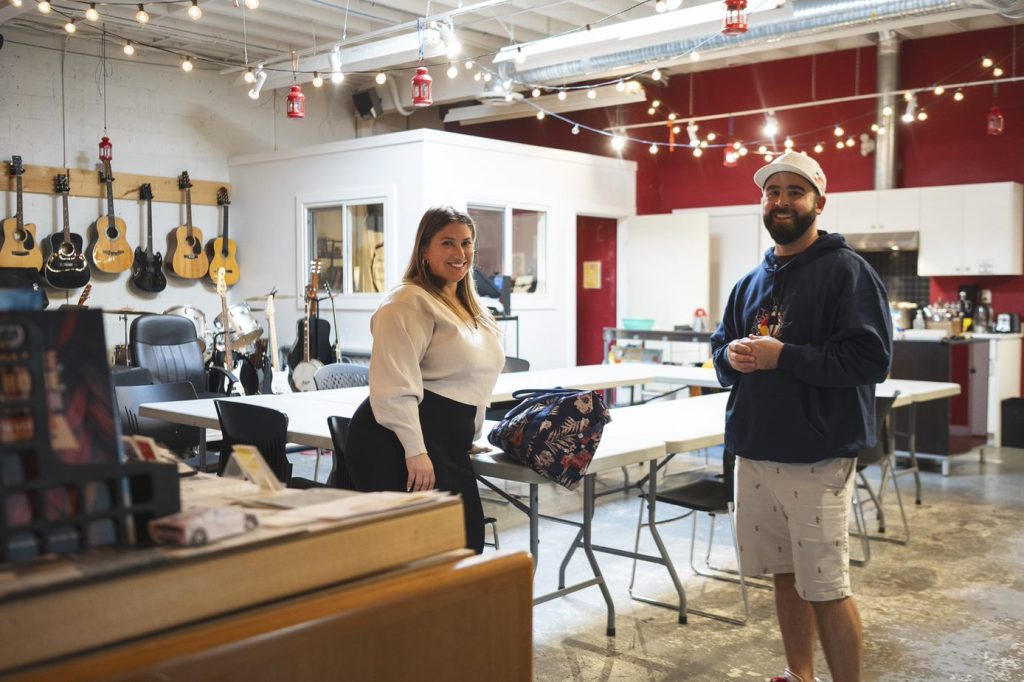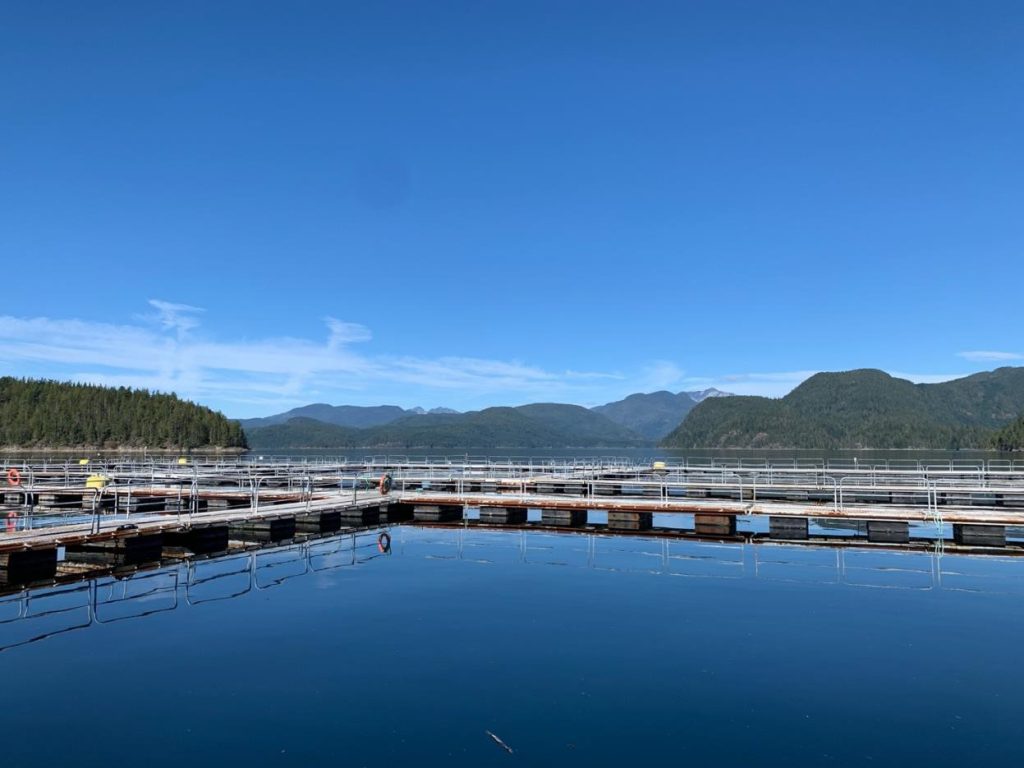Featured Stories
Meet the Indigenous farmer, training thousands of people
Explore the transformative world of Indigenous food sovereignty with Jacob Beaton, a pioneer who marries the wisdom of Indigenous principles with the forefront of agricultural technology. Known as Dzapł Gygyaawn Sgyiik, or ‘the eagle who gets it done right now,’ Jacob shares his insights on achieving food security and the critical role of the Indigenous Food Security and Sovereignty Grant.
This initiative is a beacon of hope, offering financial support to Indigenous communities, organizations, and entrepreneurs across British Columbia to develop and strengthen Indigenous food systems.
Watch as we uncover the path to sustainability, community health, and socio-economic growth through the power of Indigenous knowledge and modern innovation.
GITKSANNABIS: A BC Indigenous Cannabis Business Fund Success Story
We’re thrilled to celebrate the grand opening of Gitksannabis, the very first venture to fully materialize through the Indigenous Cannabis Business Fund (ICBF). This landmark project in Gitanmaax marks a significant achievement, not only for the entrepreneurs behind Gitksannabis but for the entire community and the ICBF initiative.
The ICBF is dedicated to empowering First Nation Communities and Indigenous entrepreneurs in British Columbia, aiming to support economic development opportunities in the cannabis sector. Gitksannabis’s journey from concept to reality exemplifies the fund’s goal to fill gaps in capacity and funding, ensuring diversity and equity in the legal cannabis space.
Are you inspired by Gitksannabis’s story? Interested in learning how the ICBF can support your venture in the cannabis industry? Visit our website to explore more about the fund and how it might help bring your project to life.
Meet the BC First Nation Enhancing Emergency Response with an AED
In this heartwarming and informative video, we delve into the life-changing impact of the Automated External Defibrillator (AED) Indigenous Initiative, which is making a significant difference in First Nations communities across British Columbia. Join us as we meet Holly from Skeetchestn, a key figure who registered for NRT’s groundbreaking AED Indigenous Initiative.
Holly shares her community’s journey towards enhancing emergency healthcare and the critical importance of having access to an AED. The initiative, aimed at improving the well-being and empowering first aid leadership in First Nation communities, has provided Skeetchestn with a much-needed AED kit. This is especially poignant considering a past tragedy in the community where a life was lost due to the absence of such a device.
Skeetchestn is one of the 25 fortunate communities to have received an AED through this initiative. The presence of an AED in the community is not just a piece of equipment; it’s a beacon of hope and a vital tool that dramatically increases the chances of survival during sudden cardiac arrests, bridging the critical time gap before paramedics arrive.
Discover how this initiative is transforming emergency response readiness and why immediate action from bystanders with access to an AED can be the thin line between life and death. We explore the profound difference that this initiative is making in First Nations communities, and how it empowers individuals like Holly to lead and safeguard their community’s health.
Don’t miss this inspiring story of resilience, community strength, and the life-saving power of technology. Watch now to see how the AED Indigenous Initiative is creating ripples of positive change and bringing hope to the heart of First Nations communities in BC.
How to Support BC First Nations: The Power of Partnership
One of the key ways to support BC First Nations is through partnership. We spoke with Tanya Corbet an FNS Appointed New Relationship Trust Board member who has over 20 years’ experience working with and leading First Nations, businesses, and not-for-profit. Currently, she provides advisory services to connect industry and Indigenous communities to build partnerships leading to economic reconciliation.
In this video she talks about the importance of partnership and how you can support BC First Nations. She dives into what you can do to make sure you have a proper long term relationship that can help you support BC First Nations in a way that is sustainable.
UNYA

The Indigenous Resilience and Recovery (IRR) Grant Program was created through a transformational partnership between the B.C. Government, Vancouver Foundation, United Way Lower Mainland and the New Relationship Trust. Through this partnership, NRT was able to fund 23 Indigenous-led Non-Profit organizations from across B.C. that were disproportionately impacted by COVID-19 and continued to face funding and operational challenges in their post-pandemic recovery.
The Urban Native Youth Association (UNYA) is one of the recipients of NRT’s IRR Grant. UNYA provides meaningful opportunities for Indigenous youth in an urban setting, by offering a wide range of services, resources, and opportunities. See video below:
Funders like the New Relationship Trust are really helpful coming out of the pandemic, we have security in this program now for the next three years moving forward. It gives me time to sort of do some more administrative work, and some more relationship building and networking with new funders, and seeking out new opportunities to get funding moving forward for the new OCM [Overly Creative Minds Youth Program]
Lucas Riedl, Director of Youth Engagement, UNYA
Just like to thank the New Relationship Trust for approaching us about this grant, for making the relationship such an easy one, and for providing the support to indigenous youth so that we can continue to provide that wrap around service…
Lucas Riedl, Director of Youth Engagement, UNYA
Kwiakah First Nation

When the Kwiakah Nation applied for a Nation Building grant, they knew their two-pronged approach might give some funders pause. But both aspects were crucial to setting this small First Nation, located along the northeast of Vancouver Island, on its chosen path to self-determination: developing a constitution as part of their ongoing treaty negotiations, and completing a feasibility study for what could eventually become a regional seaweed cultivation industry and research hub. “They [NRT] had faith in us as a small Nation that we could do that work. Our proposal was judged on its merits,” says Frank Voelker, the Kwiakah Nation Band Manager. “I can’t tell you how good it feels.” The Kwiakah Nation was able to hire a legal expert and engage nearly all of their community members in developing a constitution that cemented the Nation’s long held hereditary governance system. “It’s key to engage the membership, especially with a constitution,” emphasizes Voelker. “It’s the highest law in the land. It was really a great process seeing direct democracy at work.” The second prong of the Kwiakah Nation’s vision of self-sufficiency involved a feasibility study for a seaweed cultivation project, something Voelker said was essential in helping the Nation direct limited resources in a “very surgical, very strategic” way. “This study showed us how we can pursue this opportunity rather than just ‘spitballing’,“ he explains. In order to maximize the opportunity, the Kwiakah Nation are making use of a decommissioned fish farm on their territory as infrastructure for the project, and are in talks with post-secondary institutions to set up a research station to study the carbon sequestration potential of native kelp species. They also plan to house their Guardian program at the same location, and hire the Guardians to monitor the seaweed crops as they mature. Eventually, they hope to seed a regional seaweed cultivation industry by providing pre-processing of wet kelp to reduce transportation costs in order to make the industry cost-effective for other remote operators. And by limiting the amounts harvested, the Kwiakah Nation aims to help restore coastal ecosystems degraded by logging. “It can turn into a massive multiplier and make it viable in areas where it’s not right now,” explains Voelker, “and do it in harmony with the environment – not harming the territory, but improving it.” With a feasibility study complete, the Kwiakah Nation was able to secure funding for a business development plan, now in its final stages, and plans to launch operations as early as next year.
They [NRT] had faith in us as a small Nation that we could do that work. Our proposal was judged on its merits,” says Frank Voelker, the Kwiakah Nation Band Manager. “I can’t tell you how good it feels.
Frank Voelker Kwiakah First Nation, Band Manager
Learn more about the Kwiakah First Nation project here.
Indigenous Resilience and Recovery (IRR) Grant Recipients – Hulitan Family Services
Hulitan Family Service located on Vancouver, Island is one of the recipients of NRT’s Indigenous Resilience and Recovery Grant, and in this video we are going to share a bit more about the Indigenous Resilience and Recovery Grant or otherwise known as the IRR Grant, and share with you how Hulitan Family Services was able to leverage the NRT’s Indigenous Resilience and Recovery Grant to bring on a new staff member.
To learn more about our programs that are available please visit our Overview of Funding Programs page.
B.C. First Nations Student Success Story
The B.C. First Nations Educational Awards program provided by the New Relationship Trust. This program offers financial assistance to eligible B.C. First Nations students who are pursuing post-secondary education. Emily Salmon is just one of many students who have benefited from this program, which has helped to make higher education more accessible to B.C. First Nations students.
To learn more about the B.C. First Nations Educational Awards and how they can support your educational goals, visit our Student Scholarships and Bursaries page.
How to Partner First Nations in B.C.
There are many ways to partner First Nations in British Columbia and to tell you about a few of those ways that you could partner First Nations in B.C. New Relationship Trust talked to Dennis Thomas, Senior Business Development Officer & Elected Councillor Tsleil-Waututh Nation so that he would share with us best practices when it comes to partnering with First Nations in B.C.
To learn more about how to partner with New Relationship Trust please visit our Partner With Us page.
Building a Brighter Future: Tsawwassen First Nation’s Expertise with NRT’s Nation Building Grant
In this captivating and insightful video, we take a closer look at the Tsawwassen First Nation’s success story in leveraging the NRT’s Nation Building Grant to create a brighter future for their community. We will discuss their strategic approach, the milestones they achieved, and the invaluable advice they have for other First Nations looking to benefit from the grant.
Learn from the Tsawwassen First Nation’s expertise as they offer valuable tips and guidance for other Indigenous communities aiming to maximize the potential of NRT’s Nation Building Grant. Discover the importance of strategic planning, community engagement, and a clear vision to make the most of this incredible opportunity.
Visit our Nation Building Grants page to learn more about this program.
